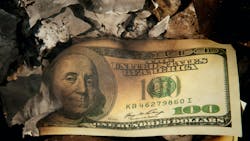Q&A: Are You Covered for Business Interruption?
It’s easy to think you’re running your shop carefully, but events out of your control can happen. Storms, fires, a careless driver crashing into your shop - these are all possibilities. You may be covered to repair your building and replace its contents, but how will you keep the business afloat if you are unable to operate within its four walls? How will you retain your staff if you have no work to complete and can’t pay them?
Over Zoom, we spoke with David Willett, Chief Underwriting Officer at Spark Underwriters, to find out how many shop owners and operators leave themselves exposed to loss without this coverage. He also serves on the Automotive Management Institute Board and several Collision Industry Conference committees.
Can you explain exactly what business interruption insurance is?
As the name implies, it provides businesses with financial assistance if something interrupts normal business flow, Willett explained.
“It’s for if you have a storm, or a fire, or something else that is a covered peril, something that damages your property or somehow causes an issue where you’re not able to perform work,” Willett said.
Willett champions Business Interruption insurance, especially in the field of collision repair. “You’re going to need to pay your employees, or you’ll lose them to competition. We know how hard it is to get them to begin with.”
He added, “You’re going to want to cover the profit you would normally get, because you don’t run businesses for free. You’re also going to want to continue to pay for your continuing expenses, utilities, or anything else you have a payment plan on.”
For insurance purposes, what counts as a business interruption?
A business interruption is a covered peril that the insurance provider will step in to assist a business owner with. “But it has to be a covered peril,” Willett explained.
“It just can’t be ‘Our business is down,’ or, ‘No one is coming in,’” Willett added. “If there is an issue that is unrelated to a covered peril in your policy, then this coverage doesn’t kick in.”
“Something [like] a fire loss or someone runs a car into one of your booths or something like that,” Willett said. “There’s a lot of stuff that could stop you from not being able to operate.”
Are the standards the same for all insurance providers or do they vary from company to company?
Like a lot of other insurance types, business interruption insurance coverages will vary, he said.
“People in downtown Dallas several years ago lost their internet after a tornado hit,” Willett shared. “Not all forms of business interruption insurance covers internet but the ones we worked with (in Dallas) did. In fact, very few do.”
What would you advise someone who’s hunting for a policy or a new insurance provider?
Willett said a shop owner should ask “Do they cover that extra expense?”
“Some will cover their loss if they have it, but I don’t know a shop owner who would rather be repairing cars than collecting insurance.” He said a common concern among owners is that rates will go up if a claim is made, which often does happen. “Plus they’re not taking care of customers, and the customers are going somewhere else.”
Also to consider, according to Willett, is waiting periods. “An industry standard is around 72 hours. After you have a claim, how quickly do want someone to work on your claim?” He also added some might have it around 24 and 48 hours, too.
Another key piece of advice that Willett shared for business owners is to look for somebody who can articulate what their business is about. “Not just somebody that got a business card with a picture of a car on it,” he jokes. A collision repairer should ask them if they know what is going on in the industry. If so, then that is a good sign that they can protect you.
What should someone do before filing a claim for Interruption of Business insurance?
Before the waiting period, Willett says a business owner must prove their loss and a history of workflow.
“Keeping good records, no matter what it is, you have to prove that the loss you’re having is not because you don’t have cars you’re working on anyways. It (the record) has to document that they’re coming through and they’ve (customers, revenue, etc.) been coming through.”
With these records, you can prove that the interruption [or peril] caused the need for your insurance to kick in.
What are some other things a shop owner should know before getting covered or things to know while they’re covered?
“A business interruption insurance that doesn’t get looked into enough is life insurance and disability,” Willett said. “It’s technically not called that in the policy, usually. But when working with shops, it’s important to bring up to them that they have their life insurance in place or their disability because that can really dramatically hurt the operations because if you lost a key employee, and there are formal means to take care of that.
"A prudent business owner and a risk manager in the form of an insurance person ought to be sitting down and going through that so that it is woven in and not just for the owner but for your key employees.”
Lastly, Willett said, “It’s not just a policy. They need to see their insurance provider as an integral part of their business.”
About the Author
Abdulla Gaafarelkhalifa
Abdulla Gaafarelkhalifa is a former associate editor at FenderBender and ABRN. He has a bachelor’s degree in English from the University of Wisconsin-La Crosse and has covered various beats beyond collision repair news such as politics, education, sports, and religion. His first car was a silver 2009 Chrysler Sebring, which he nicknamed the Enterprise because he’s a Star Trek fan. He now drives a 2014 Jeep Cherokee in order to tolerate Minnesota winters.

